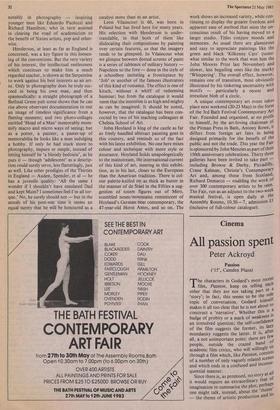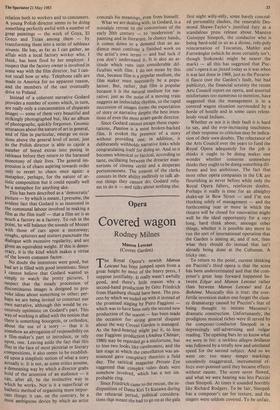Cinema
All passion spent
Peter Ackroyd
Passion
('15', Camden Plaza)
The characters in Godard's most recent film, Passion, keep on telling each other that they are not taking part in a `story'; in fact, this seems to be the sole topic of conversation. Godard himself makes it all too clear that he is not about to construct a 'narrative'. Whether this is a i badge of probity or a mark of weakness is an irresolved question; the self-confidence of the film suggests the former, its lazy mundanity suggests the latter. It is, after all, a not unimportant point: there are few people, outside the crazed band 0.f academic film critics, who will willingly sit through a film which, like Passion, consists g of a number of only vaguely related scenes and uen which aennndesri at all in a confused and inconse- quential there is, as promised, no story it would require an extraordinary feat of imagination to summarise the plot; perhaps, one might talk, instead, about the 'them! — the theme of artistic production and its relation both to workers and to consumers. A young Polish director seems to be doing something perfectly awful with a number of great paintings — the work of Goya, El Greco and Titian among them — by transforming them into a series of tableaux vivants. He has, as far as I can gather, an affair with a local factory worker who, I think, has been fired by her employer. I suspect that the factory owner is involved in some way with the film director, but I can- not recall how or why. Telephone calls are made to America for no apparent reason, and the members of the cast eventually drive to Poland.
Instead of a coherent narrative Godard provides a number of scenes which, in turn, are really only a concatenation of disparate images — some of them very beautiful and strikingly photographed but, like an album of photographs, quickly forgotten. Gnomic utterances about the nature of art in general, and of film in particular, emerge on occa- sions above the general level of noise, just as the Polish director is able to cajole a number of bored extras into posing in tableaux before they return to the harassed monotony of their lives. The general im- pression is of chaos aspiring towards order only to revert to chaos once again: a metaphor, perhaps, for the nature of ar- tistic composition but it could equally well be a metaphor for anything else.
This has been described as a 'democratic' picture — by which is meant, I presume, the evident fact that Godard is as interested in the communal labour involved in making a film as the film itself — that a film set is as much a factory as a factory. To rub in the point, he will balance the sounds of Mozart with those of cars upon a motorway; coughs, splutters and stutters punctuate the dialogue with excessive regularity, and are given an equivalent weight. If this is demo- cracy, it is the kind which makes a virtue of the lowest common factor.
No doubt the intentions were good, but bad art is filled with good intentions. Since I cannot believe that Godard wanted us simply to watch the pretty pictures, I suspect that the steady procession of discontinuous images is designed to pro- voke ideas about something or other; per- haps we are being invited to construct our own narrative, although this would be ex- . cessively optimistic on Godard's part. This Way of working is allied with the notion that there is something bourgeois, or orthodox, about the use of a story — that it is somehow an abrogation of responsibility on a film-maker's part to introduce, or rely upon, one. Leaving aside the fact that this flies in the face of most pictorial or literary ,Compositions, it also seems to be establish- , ed upon a simplistic notion of what a story actually is. It is not, as some critics assume, a demeaning way by which a director grabs hold of the attention of an audience — it can, after all, be the instinctive way in which he works. Nor is it a superficial or bathetic method of organising more impor- tant things: it can, on the contrary, be a most ambiguous device by which an artist
conceals his meanings, even from himself.
What we are dealing with, in Godard, is a nostalgic retreat to the conventions of the early 20th century — to 'modernism' in painting and in literature. In clumsy hands, it comes doWn to a demand that an au- dience must confront a finished work on the artist's own terms — and bad luck if you don't understand it. It is also an at- titude which runs into considerable dif- ficulties with film. I do not mean by this that, because film is a popular medium, the film maker must necessarily be a popu- lariser. But, rather, that film is popular because it is the natural medium for nar- rative; just as the noise of a moving train suggests an ineluctable rhythm, so the rapid succession of images forms the expectation of story or narrative despite the best inten- tions of even the most avant-garde director.
Since Godard cannot escape those expec- tations, Passion is a most broken-backed film. It evokes the presence of a story without providing one; in addition, it deliberately withholds narrative links while congratulating itself for doing so. And so it becomes whimsical or farcical, according to taste, oscillating between the drearier man- nerisms of cinema verite and a desperate portentousness. The treason of the clerks consists in their ability endlessly to talk ab- out things they cannot do; Godard refu- ses to do it — and talks about nothing else.











































 Previous page
Previous page